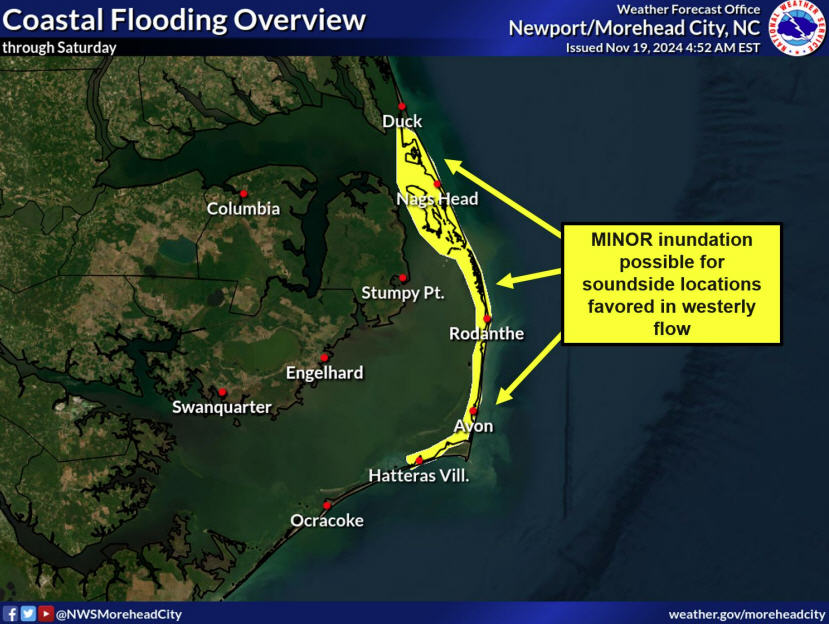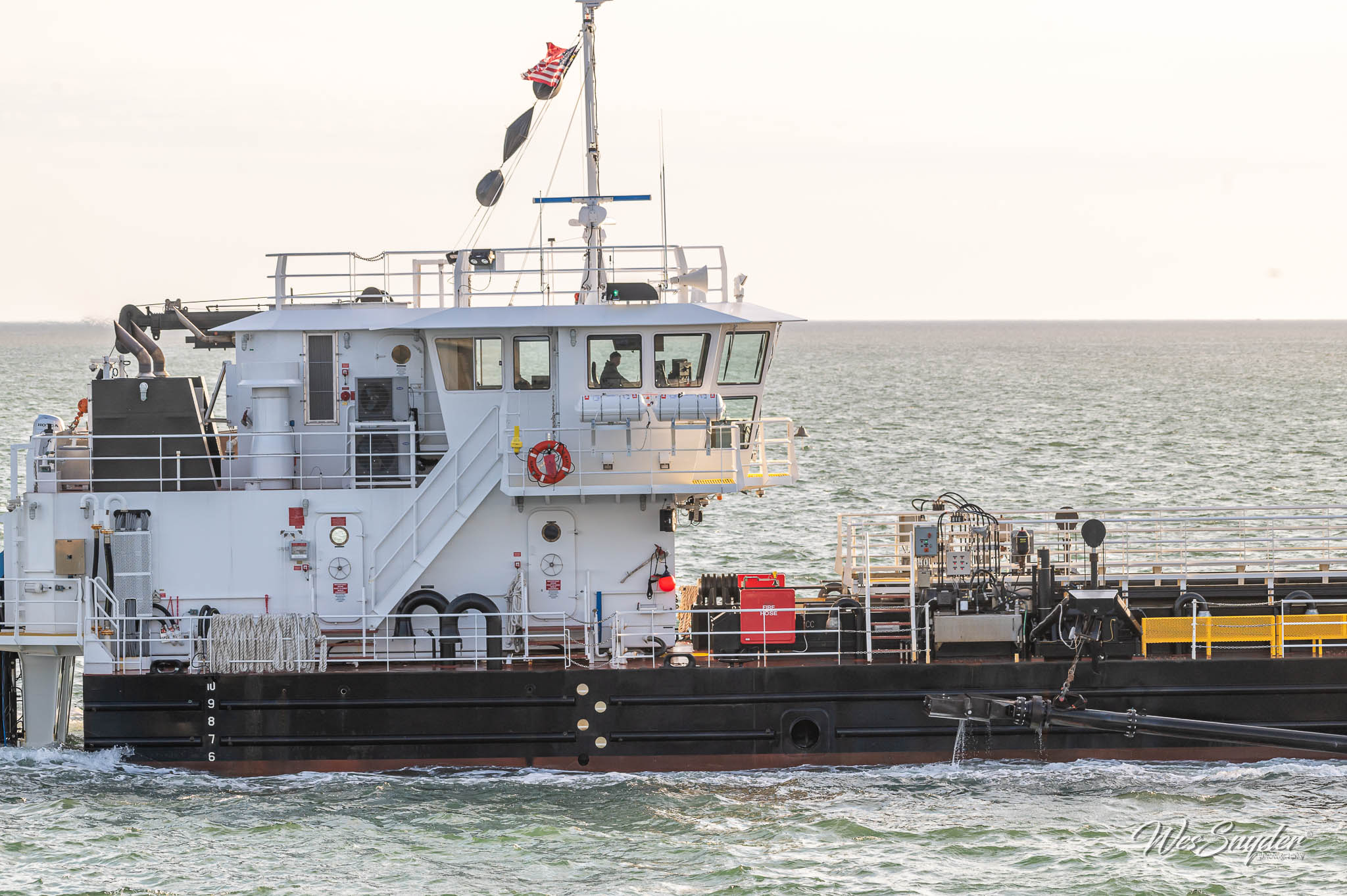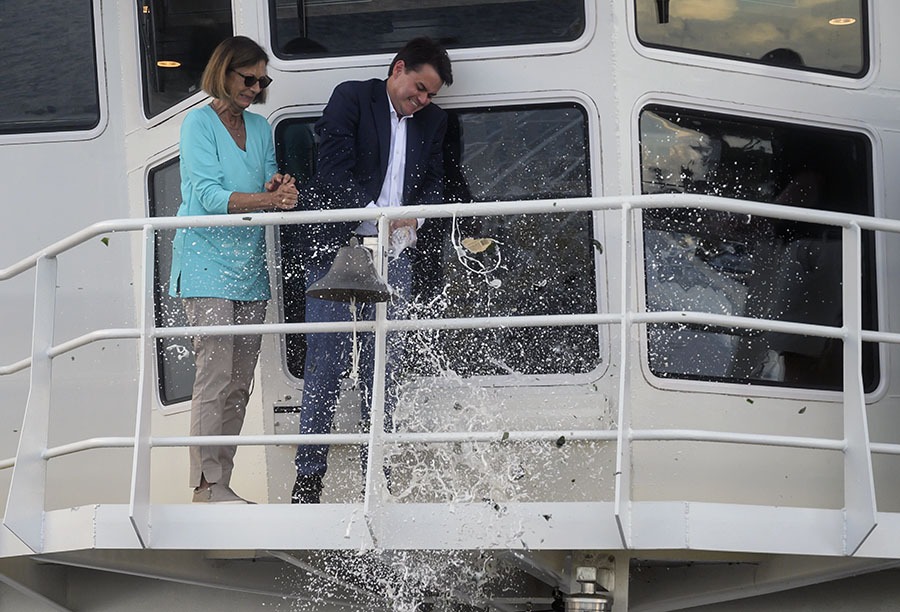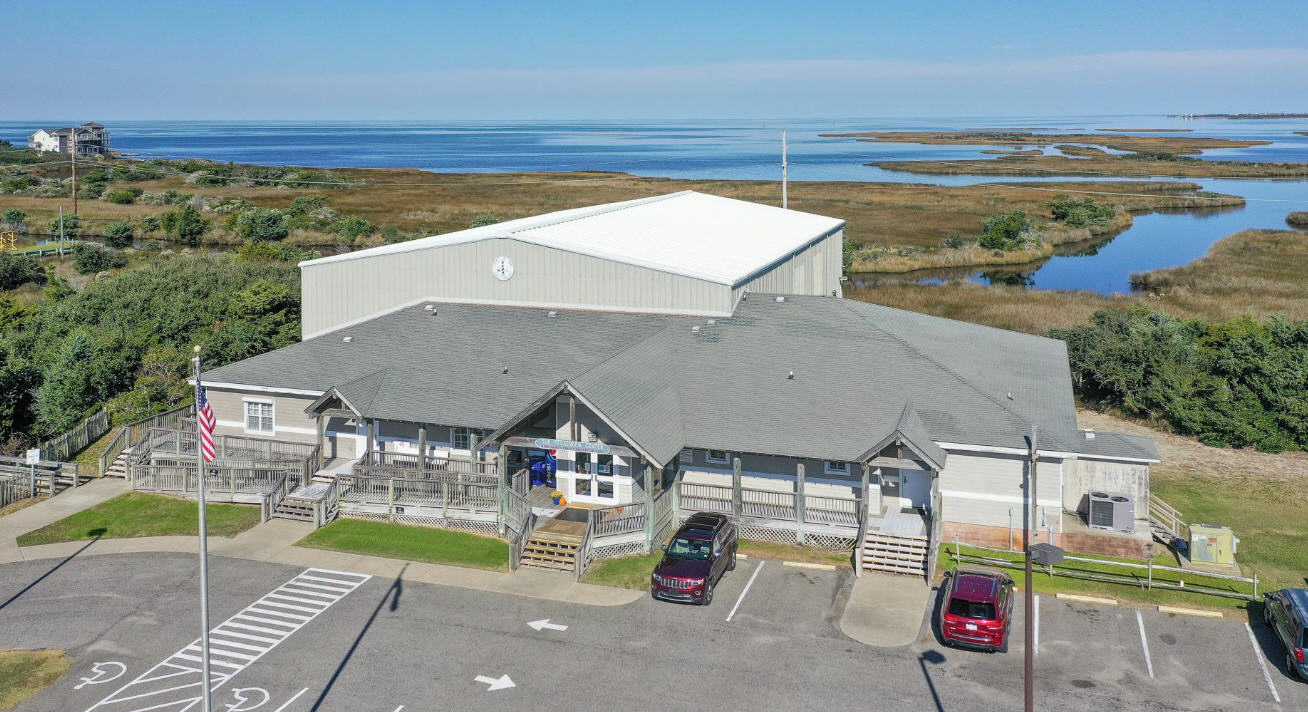The saga of the Little Hatteras boat people
My trip to work changed dramatically after Hurricane Isabel tore through our little island on Sept. 18 and created an inlet between my home in Frisco and my office in Hatteras village. It changed not only for me but also for many other folks who had to get back and forth across the new inlet to work, to shop, for appointments, to visit family or friends.
We became the Little Hatteras boat people.
For me, what used to be about a 13-minute drive in my truck was now a 30-minute trip by boat from Frisco Cove Marina to Oden’s Dock in the village. Allowing travel time to and from the docks and extra time to get in line for the boat added another hour or so to my trip. My alarm went off at 5:15 a.m. instead of 6. I need at least an hour’s quiet time to read my newspaper before I start the work day.
My adventure as a boat person started at 7:30 a.m. on Sept. 23, my first day back at work after the storm. I drove down to Sunset Strip in Frisco to catch a small boat to Hatteras village. Fortunately, Charlie Barnett, the husband of my co-worker, Donna Barnett, has a 24-foot Sea Hawk moored at his parents’ house, and he volunteered to take us to the village. Donna and Charlie live in Hatteras village, but were staying with his parents with their daughter, Hannah, until power and water were restored in the village.
The three of us boarded the Sea Hawk on that morning — after fighting hundreds of mosquitoes — and began our journey down a small creek to the Pamlico Sound.
As we left the creek, Charlie cranked up the motor and away we went. Water began spraying us from both sides. I was glad I had brought my foul-weather rain coat.
Motoring down the Pamlico Sound, we all looked in awe towards the three breaches that made up Isabel Inlet. Twelve minutes after leaving the creek, we were at Oden’s Dock. What a trip! Charlie borrowed Steve Bailey’s truck to drive us to our office. On the way, Charlie drove us out to the eastern end of Little Hatteras — as it was called to distinguish it from the rest of the island, Big Hatteras. The destruction looked worse than what we had seen in newspapers and on television.
At 5 p.m. on that afternoon, Charlie was outside the office, honking the horn. Off we went back to Oden’s Dock to begin our homeward-bound boat trip. Rather than going out the breakwater to the sound at Oden’s Dock, Charlie opted to take us home via the back creek. As we motored along the creek, we saw mounds of trash piled along the west side, which had washed up from the destroyed businesses and homes along the oceanfront. We arrived back at Sunset Strip around 5:30, and were greeted by Hannah and Charlie’s parents, Irene and Wayne Basnett. I got home around 6 p.m.
This was the beginning of 10- to 11-hour days of commuting in Charlie’s boat. The one positive thing about this two-week commute to Little Hatteras from Sunset Strip was getting to know Charlie’s parents, who are pleasant and gracious people. They were both born and raised on Hatteras. Irene is retired, and Wayne is a commercial fisherman. He knows the sound like the back of his hand. He even cut five minutes off our daily commute by showing Charlie a shorter route, closer to shore.
Donna and I finally realized that by sitting down in the bow of the boat, it was a warmer and more protected ride. We did have one hair-raising morning ride during our two-week jaunt to Little Hatteras. Charlie came close to running out of gas. We literally came into one of the docks in the back creek on fumes.
On our return trips to Frisco, Charlie was always offering other local people rides in the boat. A number of them had homes and businesses that were devastated by the hurricane. My heart went out to all of them. I was so glad we could help them out a little by giving them a ride to where they had parked their vehicles on the Frisco side.
Little Hatteras finally had electricity and water on Oct. 3. Charlie and Donna moved back to their home in the village. A short time later they were able to bring one of their vehicles back to Hatteras on the ferry from Stumpy Point.
This is when my next adventure as a boat person began.
On Oct. 6, I started commuting on the small passenger ferries that ran hourly between Frisco Cove Marina and Oden’s Dock. At 7:20 a.m., my husband, Jack, took me to the marina to catch the 8 a.m. boat to Little Hatteras. Law enforcement officers were at the marina to regulate who could and could not take the boats to Little Hatteras. Before people boarded the boat, the officers announced that village residents boarded first, followed by medical personnel, daily workers, etc. I was finally given the green light to board the Bayou Runner, which is a dive boat owned by Outer Banks Diving and captained by owner, John Pieno, and first mate Bart Smith.
The Bayou Runner started the day at 7 a.m. in Little Hatteras and made the 30-minute run every hour until its last run from Frisco Cove at 6 p.m. — a long day for John and Bart with no days off. Thank goodness I was there early on my first day because the boat filled up quickly and left before 8 a.m. The morning and evening “rush hour” of folks trying to get the boat became a daily occurrence.
The Bayou Runner holds 20 people and does have a cabin below to seat 12 people comfortably. For the first few weeks I opted to ride topside, since the weather was quite pleasant, and it was rather nice to enjoy the view of the sound and its birds.
I began to get into a routine, traveling on the Bayou Runner by getting to Frisco Cove Marina around 7:25 a.m. I would get there just in time to greet some people I know disembarking the boat after its 7 a.m. run to Frisco. We would wish each other a nice day and tell them we would see them again that evening.
On occasion when leaving Frisco Cove in the morning, Captain John would ask everyone on board to move forward to the cabin so that he could get out of Frisco Cove without running aground in the channel at low tide. He was fine, once he motored the Bayou out to the main channel in the Pamlico Sound for deeper water, which is about 10 feet.
By the fourth week, the weather turned colder, and I opted to ride below in the cabin. I recall that on one particular return trip it was a rainy day, and there must have been close to 19 people jammed into the cabin.
Weather played a major role in our daily commutes. Some days were warm and sunny, and other ones were cold and rainy. I learned to come prepared for the ride and got into a routine of carrying a bag with me that contained a sweatshirt, winter hat, rain gear (coat and trousers), and a towel for wiping off the bench on the boat when it was wet. I also packed my cell phone to call my husband if the boat was going to be early or late.
On one morning, I arrived at Frisco Cove only to be told that the boats were not running that day because of the high winds, which were blowing between 25 and 30 knots. From then on, when I awoke in the morning to the wind blowing over 25, I just rolled over and went back to sleep for an hour or so, since I knew the boat would be running late.
When daylight saving time began on Oct. 26, the boat schedules changed. Rather than leaving at 7 a.m. on both ends, they began running at 6 a.m. and making their last runs at 5 p.m. Now I started riding on the Little Clam at 8 a.m. rather than the Bayou Runner.
The Little Clam was then owned by Spurgeon Stowe and captained by Randy Fagley with first mate David “Diamond” Foley. I learned that Randy and Diamond had not had a day off in more than a month. The boat was rather open on both sides. Spurgeon had a canopy put on and some plastic put up on both sides of the boat for protection from the elements for us boat people.
To take up the overflow of people from the other two boats, the ferry system had a pontoon boat available. Although the boat had a top canvas cover and plastic sides for protection, people still could get wet in choppy water from small openings at the bottom of the plastic covers, and the bow of the boat is completely open. I managed to catch a few rides on the pontoon boat. On one afternoon, I got to the dock as it was leaving, and the captain was kind enough to back up and let me hop on. Some friends of mine on the boat thought I was going to take a flying leap from the dock to the boat before he backed it up.
The morning of Friday, Nov. 14, was one of the roughest rides we had on the boat. The forecast all had been for high winds on Thursday and Friday. By Thursday afternoon, the winds were blowing out of the northwest at more than 30 knots, and the boats stopped running. I worked at home that day. The next morning, the winds had subsided somewhat, and the boats were again running. I boarded the Little Clam, along with 19 other boat people. We were grateful for the plastic curtains, since the water was splashing onto the boat with a vengeance. At one point, the water was so rough that we all thought the boat was going to roll over on its side. There were a few white faces in the crowd that day.
On the following Monday, Nov. 17, the tide in the sound was so low that only the pontoon boat could make it across in the shallow water. We ran aground motoring out of the channel, but Captain Ervin O’Neal did a great job of maneuvering the boat off the sandbar.
In an ironic twist to the end of my time as a boat person, the pontoon boat stopped running when Highway 12 opened, so I made my last trip on the afternoon of Nov. 18 in Darryl Henrick’s small boat, just as I had made my first in Charlie Barnett’s small boat.
Even though it had been a tough two months, I had a tear in my eye as we motored into Frisco Cove for the last time and saw that the temporary ferry “landing” was being dismantled.
As I was making my last ferry trip, a newly paved highway was reopening. On the morning of Nov. 19, I drove to work for the first time in more than two months, as did all the other boat people. I am sure that they were as happy as I was that our boating days were over. However, I’m sure that all of us will never forget our adventures on the high seas and all of the nice people we met.
(This article was first published in the December 2003 issue of The Island Breeze.)












